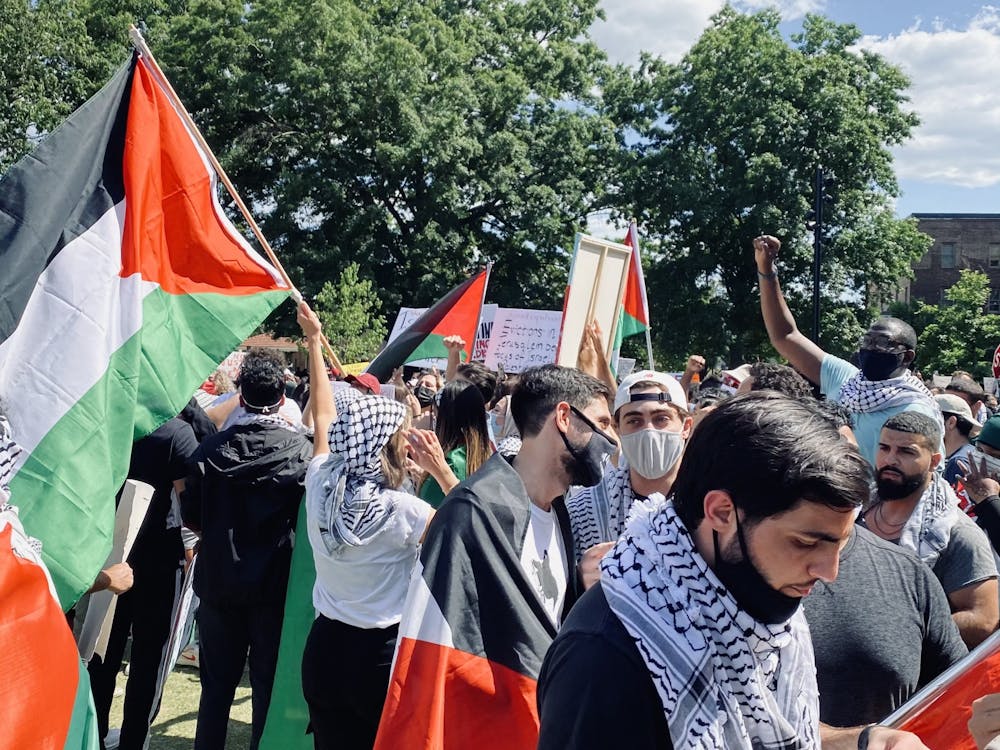Over 300 people gathered at Stafford Commons at N.C. State University on May 18 to mourn the Palestinians who died in the conflict. Seena Arafat and Lynn Zitawi, president and vice president of N.C. State’s Arab Student Organization, organized the vigil.
Zitawi and Arafat both have family in Palestine and decided to hold a vigil instead of a rally or protest so they could mourn, pray as a community and have a safe space for people who lost loved ones.
“A lot of our people in our community are in pain, a lot of them have lost family members,” Arafat said. “A lot of them wake up every day with anxiety thinking that one of my other cousins is gonna die today. I wanted to do the vigil to show we're in solidarity and that we're all here for each other.”
Attendees held candles, and Arafat and Zitawi wrote down the names of children who died. Arafat said people who lost loved ones were able to give speeches at the end of the vigil.
“All of these martyrs that had their lives taken away were people, not just numbers on a death toll,” Zitawi said. “This vigil really helped people understand the children and parents that lost their lives.”
Statewide faculty statement
Yaqub, along with Rebecca Stein, an associate professor of cultural anthropology at Duke University, and Elyse Crystall, a teaching associate professor at UNC, co-organized a faculty statement condemning recent Israeli attacks on historic Palestine.
Over 300 faculty members from 23 North Carolina colleges and universities signed the statement. Yaqub said in an email that signatories included faculty members in the liberal arts and UNC's professional schools, including the law, medicine, public health, social work, education and business schools.
Yaqub said she believes the statement represents solidarity, and Stein said she was amazed by the level of support it received.
“This has been inspiring to the Palestinians on the ground,” Yaqub said. “To know in this very difficult time there are hundreds of people, just in one state, who care enough to sign a statement like this."
Stein said the diversity of the signatories, who represent a multitude of institutions and departments, is unprecedented.
“What this tells us is the view of Palestine from the U.S. is changing — the American public is ready for a shift in the status quo where unconditional support for Israel is concerned,” she said.
To get the day's news and headlines in your inbox each morning, sign up for our email newsletters.
Stein said she believes there is a similarity between Palestinian and U.S. social justice efforts — a sentiment also acknowledged in the statement. She said she believes the struggle for justice in Palestine is similar to the struggle of racial and Indigenous groups in the United States.
History of the conflict
The discord between Israel and Palestinian territories is not new, Yaqub said.
“The problem with the Middle East is a product of antisemitism in Europe,” she said. “Jews in Europe felt they could no longer live among other Europeans and felt they needed to create their own state.”
Yaqub said when tensions worsened, some Jews fled to Palestine — the site of ancient Israel. Because Jewish immigration quotas existed in Britain and the U.S., Palestine was one of the few places they could go, she said.
At the time, Palestine was under British rule, which resulted in unequal treatment, Yaqub said.
“The Jews were Europeans — they looked European, they acted European,” Yaqub said. “So, there was an immediate affinity between the Jewish immigrants and the British governing Palestine. Whereas the Arabs, they were another people, another culture, another language. They were considered barbarians and were treated that way.”
Yaqub said Zionism — a movement that called for the creation of a Jewish state in Palestine — was present during this time. She said unequal treatment between the Palestinians and Zionists led to tension in the region.
Complications heightened when Britain promised the Arab residents independence in exchange for support during World War I, Yaqub said. The British later retracted this agreement and decided to move forward with the creation of a Jewish state.
“They were very upset (with) the idea of the creation of a Jewish state because they’re not Jewish,” Yaqub said. “So this wouldn’t be their state.”
The establishment of Israel left hundreds of thousands of Palestinians displaced from their homes, she said. Israel has militarily occupied historic Palestine since 1967.
Yaqub said present-day Palestinians are not regarded as citizens and are governed by different rules than Israeli citizens.
'We have a duty to understand Palestine'
Stein said she encourages the public to push beyond mainstream media and further educate themselves on the experience of Palestinians.
“Their everyday struggles are easy to forget if you focus only on mainstream perspectives,” Stein said.
Yaqub said students can take action by joining and creating activist groups.
“We have a duty to understand Palestine,” she said.
Students can also get involved through taking related coursework, Yaqub said. She said she also encourages UNC faculty to integrate Palestinian history into their curriculum.
While some may feel helpless because they cannot directly help Palestinians, Atieh said, people can still show their support for the Palestinian community in the U.S. and spread the word domestically.
Atieh said UNC and colleges in general should be doing more to raise awareness about the conflict and the violence against Palestinians.
"They should be trying to garner support," Atieh said. "Just because it’s happening outside of the U.S. doesn’t mean you can detach yourself.”
city@dailytarheel.com | university@dailytarheel.com
CLARIFICATION: A previous version of this article unclearly attributed a quote by only stating the speaker's pronouns. The article has been updated to clearly attribute the quote. The Daily Tar Heel apologizes for this error.



